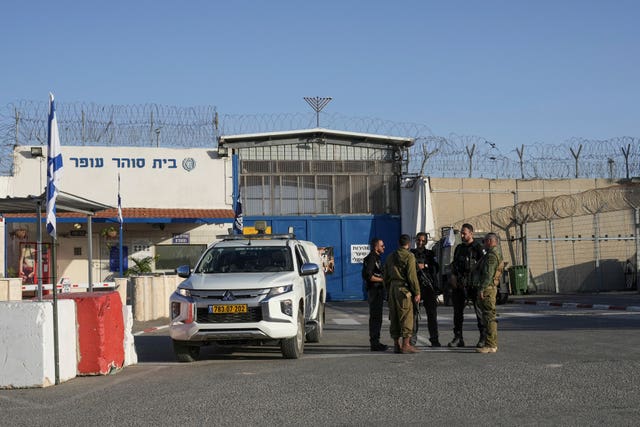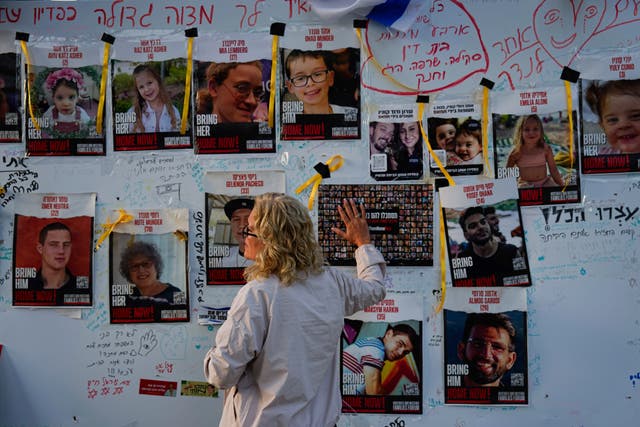
Simon Marks 3pm - 7pm
24 November 2023, 15:14

The four-day truce raised hopes of eventually winding down the conflict.
A four-day ceasefire between Israel and Hamas is under way, allowing aid to start flowing into Gaza and setting the stage for the release of dozens of hostages held by militants and Palestinians imprisoned by Israel.
There were no reports of fighting in the hours after the truce began.
The first exchange on Friday afternoon involved swapping 39 Palestinian prisoners – 24 women, including some convicted of attempted murder for attacks on Israeli forces, and 15 teenagers jailed for offences like throwing stones – for 13 Israeli hostages, Palestinian authorities said.
Just before that exchange was set to happen, Thai Prime Minister Srettha Thavisin said 12 Thai nationals had been released. An Israeli source confirmed that the Thai captives had left Gaza and were en route to a hospital in Israel.
The deal offered some relief for Gaza’s 2.3 million people, who have endured weeks of Israeli bombardment and dwindling supplies of basic necessities, as well as for families in Israel worried about loved ones taken captive during Hamas’ October 7 attack which triggered the war.
The truce raised hopes of eventually winding down the conflict, which has flattened vast swaths of Gaza, fuelled a surge of violence in the occupied West Bank and stirred fears of a wider conflagration across the Middle East.
Israel, however, has said it is determined to resume its massive offensive once the ceasefire ends.
On Friday, it brought quiet after weeks in which Gaza saw heavy bombardment and artillery fire daily as well as street fighting as ground troops advanced through neighbourhoods in the north.
The last report of air raid sirens in Israeli towns near the territory came shortly after the truce took effect.
Not long after, four tankers with fuel and four with cooking gas entered the Gaza Strip from Egypt, Israel said.
Israel has agreed to allow the delivery of 130,000 litres of fuel per day during the truce – still only a small portion of Gaza’s estimated daily needs of more than one million litres.

For most of the past seven weeks of war, Israel had barred the entry of fuel to Gaza, claiming it could be used by Hamas for military purposes – though it has occasionally allowed small amounts in.
UN aid agencies pushed back against the claim, saying fuel deliveries were closely supervised and urgently needed to avert a humanitarian catastrophe since fuel is required to run generators that power water treatment facilities, hospitals and other critical infrastructure.
The Israeli military dropped leaflets over southern Gaza, warning hundreds of thousands of displaced Palestinians who sought refuge there not to return to their homes in the territory’s north, the focus of Israel’s ground offensive.
Even though Israel warned that it would block such attempts, hundreds of Palestinians could be seen walking north on Friday.
Two were shot and killed by Israeli troops and another 11 were wounded. An Associated Press journalist saw the two bodies and the wounded as they arrived at a hospital.
During the ceasefire, Gaza’s ruling Hamas group pledged to free at least 50 of the about 240 hostages it and other militants took on October 7. Hamas said Israel would free 150 Palestinian prisoners.

Both sides agreed to release women and children first, in stages starting on Friday. Israel said the deal calls for the truce to be extended an extra day for every additional 10 hostages freed.
Early in the day, ambulances were seen arriving at the Hatzerim air base in southern Israel, preparing for the release.
Those freed will then be taken to hospitals for assessment and treatment, Israeli officials said.
The hope is that “momentum” from the deal will lead to an “end to this violence,” said Majed al-Ansari, a spokesman for the Foreign Ministry of Qatar, which served as a mediator along with the United States and Egypt.
Hours before it came into effect, Israeli defence minister Yoav Gallant was quoted as telling troops that their respite would be short and the war would resume with intensity for at least two more months.
Prime Minister Benjamin Netanyahu has also vowed to continue the war to destroy Hamas’ military capabilities, end its 16-year rule in Gaza and return all the hostages.